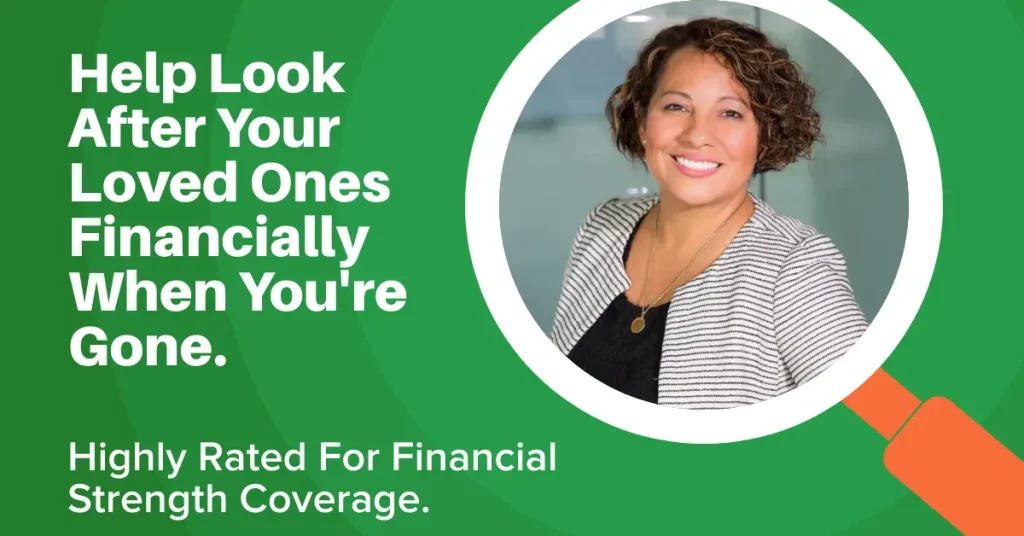Discover Life Insurance For Women In 2025

Unlike a generation ago, men are no longer considered the sole breadwinners of a household as women increasingly work and carve out their careers.
With many women taking on more responsibility for running the home and children, it’s even more critical that they start thinking about life insurance from day one. Proportionally, however, women are still less likely to have their own life insurance.
Life insurance for women applies to all circumstances, whether you are an older mother, a single mum, or expecting your first child. Why not provide the financial peace of mind that you and your loved ones deserve should you die unexpectedly, which can be provided by a secure life insurance policy?
Help Protect Your Family’s Future, Compare Top Insurers. Find Your Cheapest Quote


Reasons To Consider Getting A Free Quote Today:
- Friendly and easy-to-use service
- Outstanding reviews for customer care
- Get a policy that is tailored for you. Be fully protected whatever happens
- Provide a financial cushion for your loved ones in case of an unexpected tragedy
- Policies with excellent rates for shared coverage, including same-sex couples
- Have you been declined elsewhere? Let us help you get the cover you need
What Is Life Insurance for Women?
Read on to learn about the different life insurance for women options available to you and how to choose the best type of coverage for your needs.
Life insurance is financial protection through a lump sum payout should you die unexpectedly. It removes the worry that debts will not be repaid or your dependents will struggle should you pass—the lump-sum funds through the payment of regular premiums into a policy paid to an insurance provider.
Types of Life Insurance for Women
| Type of Insurance | Description | Ideal For |
|---|---|---|
| Term Life Insurance (Level or Decreasing) | Coverage for a specified period. Level term has a fixed payout, while decreasing term reduces over time. | Large payouts for loved ones, covering mortgages, or leaving an inheritance. |
| Whole of Life Insurance | Provides lifelong cover with a guaranteed payout upon passing. | Older individuals in good health, covering funeral costs or leaving an inheritance. |
| Over 50s Plan | Guaranteed acceptance for ages 50-85 without medical information. | Women over 50, especially those with health issues. |
| Family Income Benefit | Provides monthly tax-free income payments to the family instead of a lump sum. | Families needing regular income support. |
Considerations for Specific Groups
| Group | Considerations | Policy Benefits |
|---|---|---|
| Pregnant Women | Can apply during pregnancy; premiums are not affected by pregnancy. | Financial protection for the family, covering childcare and living expenses. |
| Mums | Ensures children’s financial stability and lifestyle. | Covers childcare fees, household bills, and mortgages. |
| Single Women | Useful even without dependants for covering personal debts and funeral costs. | Financial security for loved ones, covering funeral expenses. |
| Joint Policy Holders | It covers both partners under one policy, and the payout is after the first death. | Cost-effective, but consider separate policies for comprehensive coverage. |
Factors Influencing Life Insurance Costs for Women
| Factor | Description |
|---|---|
| Age | Younger applicants often receive lower premiums. |
| Health | Good health can lead to more favourable premiums. |
| Lifestyle | Healthy lifestyle choices (non-smoking, moderate alcohol) can reduce premiums. |
| Coverage Amount | Calculating exact coverage needs prevents overpaying. |

How Life Insurance Covers Women With Varying Personal Circumstances
As women progress through the various life stages, their professional and personal circumstances will change.
Life insurance is a flexible type of insurance. A policy is fully adjustable to reflect your ever-changing circumstances, like a pay rise, purchasing a bigger home, the arrival of a new child, or even separating from a partner.
All women will have different circumstances, and a life insurance plan provides full flexibility. Below is a list of the main situations a woman may encounter, allowing you to relate to how a life policy can best suit your circumstances.

Life Insurance for Single Women
After a separation or the death of a partner, a single mother still has responsibility for her children’s welfare and paying bills and rent or a mortgage.
If a life insurance policy is already in place in joint names, this can be cancelled and replaced with a single life insurance plan in the mother’s sole name. In case of a separation, it is prudent to maintain a dialogue with an ex-partner to ensure sufficient protection covers the whole family, including the children.
Save Money And Get A Quote Now. Protect Your Family Before It’s Too Late.


Life Insurance for Stay-At-Home Women
If you stay at home, it typically means that your partner is the breadwinner as they have significantly more earning potential. Staying at home probably means your daily tasks include cooking, cleaning, food shopping, picking children up from school, and any subsequent homework.
If anything were to happen to your partner or yourself, how would you maintain your lifestyle or pay household expenses and childcare?
An insurance policy can provide that financial peace of mind through a payout that can help a family pay their bills and maintain their quality of life should a partner die unexpectedly.
Life Insurance for Pregnant Women
If you are pregnant, you can take out a new life policy without affecting the cost of coverage.
A life insurer will need answers to questions such as your lifestyle and whether you had any pre-existing health conditions before you were pregnant.
If you are young, healthy, have a clean medical record, and do not smoke, premiums are unlikely to be any different to a woman who is not pregnant. However, answering all questions honestly, including your pregnancy, is crucial to ensure the cover closely aligns with your circumstances.
Life Insurance for Women Who Are Self-Employed
If you are self-employed, you most likely will not have a guaranteed salary, unlike an employee in a company. Your financial means will be adversely affected if there is a business downturn.
A life insurance policy for women can provide financial protection and peace of mind that comes with knowing should anything happen to you. Your loved ones will be looked after through a monetary payout.

Life Insurance for Women That Are Mothers
If you have recently become a mother, it is worth taking out one of the life insurance products as soon as possible. The sooner you can take out life cover, the lower the monthly premiums, as you are deemed less likely to have any underlying medical issues.
You should try and minimise any risk that an unexpected death could have and the terrible effects on a family when a child is young. You can reduce such an eventuality through life insurance for women.
Life Insurance for Older Women
People generally live longer, but you can still purchase life insurance even if you are an older woman.
If you are older, the cost of monthly premiums will typically be higher as an insurer will assess the increased likelihood that you may die compared to a younger woman, especially if you have any underlying health conditions.
For women in their 50s or 60s, a lower-cost type of policy known as an over 50s plan is available if you have already paid off your mortgage and no longer have children financially dependent on you.
This type of plan is a good option if you wish to provide loved ones with a small lump sum of money to pay for your funeral. We will cover over-50s plans in the next section.
Life Insurance for Women That Smoke
Life cover is also available for women who smoke. Smokers need to know the full extent of their smoking activities at the start, as it will affect the cost of premiums.
The monthly premium for smokers is more likely to be slightly higher than for a non-smoker and, if not declared, may see a policy voided if a payout is required due to smoking-related death.
Joint Life Insurance
If you take out joint life insurance with a partner, both lives are covered simultaneously under a sole policy paid for with a single monthly premium.
With a joint policy, a payout occurs once, and following the first death, the coverage expires. This means the remaining partner must take out new life insurance, which will likely be a little more expensive at an advanced age.
It is the one downside to a joint plan and can be avoided by taking out two separate policies if required.

What Are the Different Life Insurance Options Available?
There are several life insurance options available for women, and we will provide a broad overview of each of them:
Whole of Life Insurance
Whole of life insurance is the highest-cost life insurance for women. A financial payout is due upon your death, whenever that is. As it is open-ended, the policy has no fixed duration, which means it is more expensive than a fixed-term policy.
With whole of life, the younger you are at the start of the plan, the lower the cost. If you are an older woman and do not start a plan until you are in your 40s or 50s, the monthly cost of this type of women’s life insurance can be very high.
Term Life Insurance
A policy known as term life insurance is one with a fixed end date. A term life insurance policy is often set up to tie in with the duration of a repayment mortgage or other longer-term financial commitment, which, once paid, results in you becoming debt-free.
A term life insurance plan is a lower-cost option compared to a whole of life policy. No payout is due when the policy expires should you subsequently die.
Over 50s Plans
Getting a term or whole life insurance is still possible if you are over fifty. However, it can be more expensive. As mentioned earlier in this guide, an over 50s plan is a cheaper option.
This type of plan pays less than other options. It works on a guaranteed acceptance basis, where you automatically qualify for cover regardless of any pre-existing medical conditions.
The payout on over 50s plans typically caps at around £30,000. Over 50s plans are useful for paying off small debts such as credit card balances and personal loans or leaving money for funeral costs or monetary gifts for children or grandchildren.

Family Income Benefit
Family income benefit works similarly to life insurance, where dependents will be financially protected should you pass away.
The critical difference lies in the monetary amount paid. Instead of receiving a one-off payout, as with a life policy, dependents will receive payments broken down monthly, which helps them budget better than receiving a large lump sum.
Female Life Insurance Options – Premium Variations
With women’s life insurance, a policy’s flexibility extends to the level and cost of cover throughout a policy. Depending on your current or expected circumstances, you can choose from three types of premium: level, increasing, or decreasing cover.
Increasing Term Cover
The premium cost and payout level are tied to inflation, as measured by the UK government’s Consumer Price Index (CPI). If inflation rises, increasing the cover amount will ensure that any payout will have the same purchasing power during or at the end of a policy as when the plan was started.
Decreasing Term Cover
The premium and payout amount will decline throughout the policy to align with your financial circumstances. For example, the policy may be removed to match a repayment mortgage, where payments also reduce over time as the mortgage gets paid off.
Level Term Life Cover
The cost of the premium and the subsequent payout will stay the same for the policy’s duration. The downside of level cover is the payout’s size will be relatively small towards the end of a policy, especially if there is high inflation, as, unlike increasing cover, it does not keep pace with the CPI index.
If you want to apply for a life insurance policy that correctly aligns with your circumstances, call 0203 129 88 66 for a free life insurance quote. One of our partners will be on hand to review all your insurance options, including an accurate quote from our vast list of insurers.
Terminal Illness Cover
Terminal illness cover is typically included in a life insurance policy. When taking out cover, you should ask your insurer if your chosen plan includes terminal illness cover.
Terminal illness protection permits you to make an early payout claim on your life insurance policy if you become diagnosed with a terminal illness and are likely to pass away within a year of diagnosis.
An early financial payout can help with high medical costs and give you time to organise your estate while spending precious time with your family and loved ones.

How Do You Choose the Best Life Insurance Cover for Your Needs?
Life insurance for women is not a product where one size fits all, as people have different requirements according to their stage of life and financial circumstances. The lowest-cost policy is most definitely not always the best cover.
Understanding your financial obligations and creating a policy around these requirements is crucial. A reputable life insurance broker like Insurance Hero will work with you to assess your needs and create a tailored policy.
A secure policy will then offer the flexibility for adjustment as your life and requirements evolve.
How Much Does Life Insurance for Women Cost?
The cost of life insurance can vary significantly between individuals. Professional underwriters use a complex series of models and algorithms to provide a quote that accurately matches your circumstances.
To understand your situation, questions must be asked to calculate a premium that reflects your activities and lifestyle and is highly likely to pay out when needed.
To get an accurate life insurance for women quote, the following questions might be asked:
- What is your annual, monthly or weekly salary?
- Do you have a pre-existing medical history with underlying health issues?
- Do you drink alcohol? If so, what is your average alcohol consumption?
- What is your smoking status? Are you a smoker or a non-smoker?
- What is your height?
- What is your weight and body mass index (BMI) level?
- How much life insurance do you need?
- What is your age, and how long do you need life insurance coverage?
The answers to all these questions will be considered and will come up with the level of likelihood that you will die. A 28-year-old non-smoker with no underlying medical conditions will pay a lower premium than a 50-year-old smoker with a medical condition.
Pregnancy information also needs to be disclosed. However, you don’t have to inform your insurance provider if you have existing life insurance.
Insurance Hero partners are experienced in providing life insurance coverage tailored specifically to women’s needs. Please call 0203 129 88 66 today for a competitive, no-obligation life insurance quote.
Associated Types of Women’s Life Insurance
Critical Illness Cover
Critical illness coverage has a long association with life insurance, which can be included as part of an additional feature of a policy or as a stand-alone cover.
Critical illness cover provides financial peace of mind for you and your dependents should you become unable to work.
Unlike life insurance, the payout is not dependent on death. Instead, a lump sum is provided should you survive at least ten days from the diagnosis of a critical illness and no longer be able to work.
The list of qualifying illnesses is decided at the outset of a plan and can be tailored to include diseases that may be more specific to women; otherwise, a list of standard conditions that are covered will apply.
Critical illness cover generally applies to the following:
- Parkinson’s disease
- Motor neurone disease
- Heart valve replacement or repair
- Multiple system atrophy
- Loss of hand or foot
- Structural heart surgery
- Benign spinal cord tumour
- Traumatic brain injury
- Alzheimer’s disease or pre-senile dementia
- Benign brain tumour
- Severe lung disease
- Coronary artery by-pass grafts
- Systemic lupus erythematosus
- Primary pulmonary hypertension
- Paralysis of a limb
- Major organ transplant
- Creutzfeldt-Jakob disease
- Spinal stroke
- Aplastic anaemia
- Cardiac arrest
- Aorta graft surgery
- Blindness
- Certain types of cancer
- Third-degree burns
- Terminal illness
- Stroke
Income Protection
Income protection is another type of financial protection cover; it does not rely on your death to benefit.
Income protection provides a replacement salary if you are unable to work for a period due to an accident or illness.
The start of a plan specifies when a replacement salary kicks in after you cannot work. It can start as little as one month or as long as one year after you stop working. It usually matches your employer’s work policy regarding salary and absence from work.
As with other types of monetary protection, income protection works through regular monthly premiums paid to an insurer, the amount of which is agreed upon at the start of a policy.
You should consider Income Protection if you have financial commitments you would struggle to pay should you be unable to work.
These include:
- An outstanding mortgage
- Equity release loan
- Outstanding credit card debt
- Personal loans
- Hire purchase agreement
- Bank overdraft arrangements
- Personally guaranteed business loans
- Car loans or contract hire
- School or further education tuition fees
Womens Life Insurance Case Studies
Case Study 1: The Young Family – Sarah and Robert
Sarah and Robert are a young couple in their early 30s, living in Manchester. They have two little daughters, ages 3 and 5. As a primary school teacher and construction worker, they strive to provide the best life possible for their family.
Sarah recently came across an article about women’s life insurance policies and how they can provide financial stability in unexpected circumstances. Recognising the importance of this, she began to explore options.
Sarah discovered that women’s life insurance often comes with benefits like coverage for terminal illnesses and the ability to add critical illness coverage. This means the policy would not only provide financial support to her family in the event of her untimely passing but also the case of a severe illness. She was also relieved that the premiums were more affordable than initially thought.
Using a woman term life insurance calculator online, she was able to estimate her potential premium costs and the amount of coverage she could get. The result was surprising – the coverage was far more than she had expected for the price.
Sarah decided to take out a woman’s life insurance policy. It provided peace of mind for her and Robert, knowing they had taken steps to protect their daughters’ future.
As an additional benefit, her policy could be used as a potential savings or investment platform, with cash value accumulating over time.
Case Study 2: The Empty Nesters – Linda and Peter
Linda and Peter, both in their late 50s, live in a small, picturesque town in Cornwall. With their three children grown and living independently, their primary concern has shifted to Linda’s mother, who recently moved in with them due to her declining health.
Peter had a life insurance policy from his younger days. Still, Linda hadn’t thought much about life insurance catering for women like herself until they started caring for her elderly mother. She understood that if anything were to happen to her, the burden of care and expenses would fall on Peter and possibly their children.
Upon researching, Linda found that women’s life insurance can play a significant role in protecting her family’s financial stability. If she were to pass away suddenly, the death benefit could be used to care for her mother or even cover her funeral expenses.
She discovered that women her age could still take out women’s life insurance policies. She was pleased to find a policy with premiums that didn’t skyrocket with age, as sometimes with some life insurance policies.
Linda secured a woman’s life insurance policy and felt profound relief. Her decision guaranteed that, even in her absence, her loved ones would not be unduly burdened financially.
In both these cases, life insurance provided security and peace of mind for these women and their families. It proved an essential step in their financial planning, ensuring they could offer their loved ones the protection they deserved.
Whatever your circumstances, whether you are an older woman, a school or college teacher a woman that smokes, a mother, or a mum-to-be, a life insurance policy can provide financial peace of mind.
It will take away the day-to-day worry of what will happen should you die unexpectedly by ensuring that outstanding debts are repaid and allowing dependents to maintain the same level of lifestyle as when you were alive.
Remember, the sooner you take out women’s life insurance, the more instant financial protection you will have, and monthly premiums for younger women are likely to be lower.
If you are married and your husband is interested in cover, help is available. Dads’ life insurance plans are also an area are partners are familiar with.
Get a policy that is tailored specifically for you. Be fully protected, whatever happens.
Also, check out our article on the definition of critical illness.
Steve Case is a seasoned professional in the UK financial services and insurance industry, with over twenty years of experience. At Insurance Hero, Steve is known for his ability to simplify complex insurance topics, making them accessible to a broad audience. His focus on clear, practical advice and customer service excellence has established him as a respected leader in the field.


